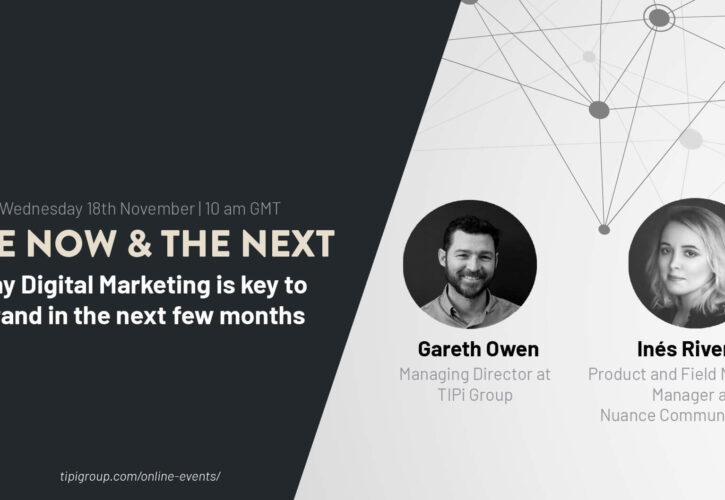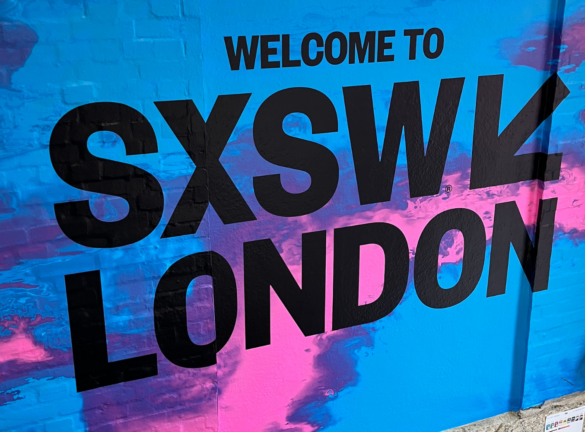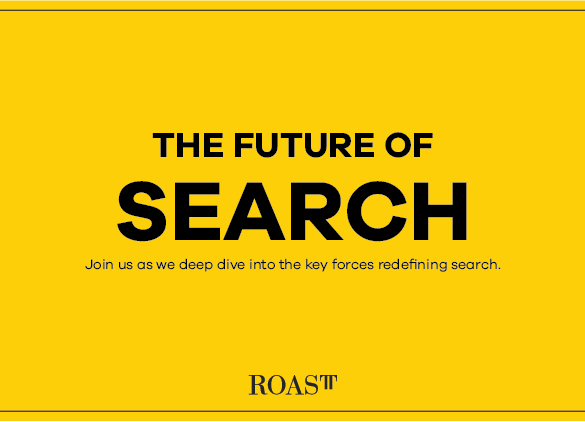
The Now & The Next: Why Digital Marketing is Key for Brand
On Wednesday, Gareth Owen, Managing Director at TIPi Group, sat down with Inés Rivera, Product and Field Marketing Manager at Nuance Communications (previously HCA Healthcare) for a one-on-one chat on the future of digital and the impact of brand in digital marketing over the coming months.
As we come to the close of a tumultuous year, the pair reflected on the ways in which digital strategies across B2B and B2C in the healthcare, legal and finance sectors had to adapt to stay relevant and how these changes have framed their outlook for 2021.
A video of the session is available to watch here, and the key points are copied below:
Gareth Owen: Inés, what do you think the now looks like in B2B?
Inés Rivera: Well Gareth, it’s been a very interesting period for both B2B and B2C, however across the board we’ve seen content strategy as a key focus.
Where face-to-face interaction is limited, we’ve had to shift our strategy. We’ve seen an acceleration of digital transformation, particularly for B2B, and social media has become an important source of information for consumers.
We’ve witnessed a lot of changes across B2B and B2C, all related to digitalisation. Now more than ever, messaging needs to be consistent and relevant to the context that we are living in.
GO: What systems and processes do in-house teams have in place to ensure they deliver consistent messaging across channels?
IR: It’s imperative that you have a core message that remains consistent across the channels you are working with. One aspect of this is ensuring that you understand the buyer persona, in order to give them useful content; once you have this structure in a marketing strategy, you can recreate it across all channels.
GO: In terms of the technical differences between B2B and B2C leads, what sort of challenges does this create?
IR: In B2B, consumers come to us at a certain part of the funnel, so we can tailor content for them. In the B2C environment, however, consumers behave more impulsively, they are looking for quick, short, crisp and sweet messages.
B2B and B2C require very different messages, with their own tailored information to the stage that they are at.
GO: Take us back to March, what was your experience at that point?
IR: Before March, it was business as usual. While I was working at HCA in the healthcare vertical, people were ready to book appointments and happy to go to the hospital, thus we were focussed on an acquisition model and were aggressive with our marketing strategy.
That has changed in the current situation and we’ve had to adapt our strategies. We had to shift our content to reflect the current context and operations within each organisation, moving to digital appointments as an example.
Searches on medical advice have doubled since the start of the pandemic as people seek out advice on staying healthy. As we entered lockdown and became less able to take physical bookings, we had to change tack from an acquisition strategy to a brand strategy, providing the consumer with positive messages over persuasive messages, whether this is on booking for the future, learning more or providing key information to high risk patients.
In a stressful period, brand can play a key role in solving issues or offering peace of mind. The more you address fears and concerns through key content, the more you will engage your user base and reinforce your brand as a result.
GO: To what degree did you see an impact on your KPIs and CPAs?
IR: Within the B2B financial and legal sectors we’ve seen different trends and changes.
Platforms such as LinkedIn that were consistently effective for B2B social media have seen a dip, while other platforms such as Instagram and Facebook have been useful for promoting events for example. We’ve paid close attention to channels behaving differently, looking at spend, Cost-Per-Clicks and measuring ROI.
The key has been our ability to adapt; at Nuance, we’ve been embracing digital fully and we can attribute our success working across different regions of the world to this approach, combined with paying close attention to attribution and analytics, with a focus on understanding the value of digital activity and the shifting behaviours of our customers.
GO: Looking at the next, with Brexit looming, what do you think is coming?
IR: From a Nuance point of view, we’ve embraced digital rapidly and have a good leadership team positioned for growth. However, our customers will definitely be affected by the political changes, especially in the legal and financial sectors.
We’ve been working proactively to be prepared to help our customers when they need it most, through research and surveys to understand their needs for 2021.
In the Finance sector, people are worried about their investments and how changes in the law will impact them, we are trying to prepare them to solve those issues ahead of time. Cybersecurity and customer service are also important areas within finance and our clients have been benefitting from our AI chatbots, which free up time for their customer representatives to work on more complex problems and ultimately give the customer a faster response.
Our own strategy at Nuance has had to change, and we are working with a PR agency and re-designing our website to ensure our messaging is clear. We’re starting to use channels such as blogs to drive traffic and funnel leads through providing users with more information so that they have higher intent once they get to our sales team.
GO: There has certainly been a step-change in the way people use digital since the pandemic started, but looking at 2021, what do you think the key trends will be?
IR: 2021 is going to be an interesting year for B2B and B2C, and we will continue to focus on digital but will be paying close attention to the channels that deliver the best results.
I can see digital becoming more than an assistive piece of line marketing, shining in its own right as a revenue stream across all channels.
GO: Are there any trends you are interested in for the coming year?
IR: Definitely, all the trends we’ve spoken about are exciting prospects, both in B2B and B2C. However, I believe that it’s only when you have the right strategy, combined with the right team or agency that those trends solidify to their full potential and generate results.
I see the marketing of the future, increasingly using emerging technology, with the help of AI and analytics, to help us find out more about potential customers, and to give them a more detailed message and experience.
Ask yourself, is your company ready for that? If it is, does it have the right marketing team to make that happen?
Thank you to Gareth and Ines for a fantastic session. If you are curious to read more, head to the write up of The Now & The Next: Retail. To watch all previous sessions head to TIPi Group’s event’s page.






